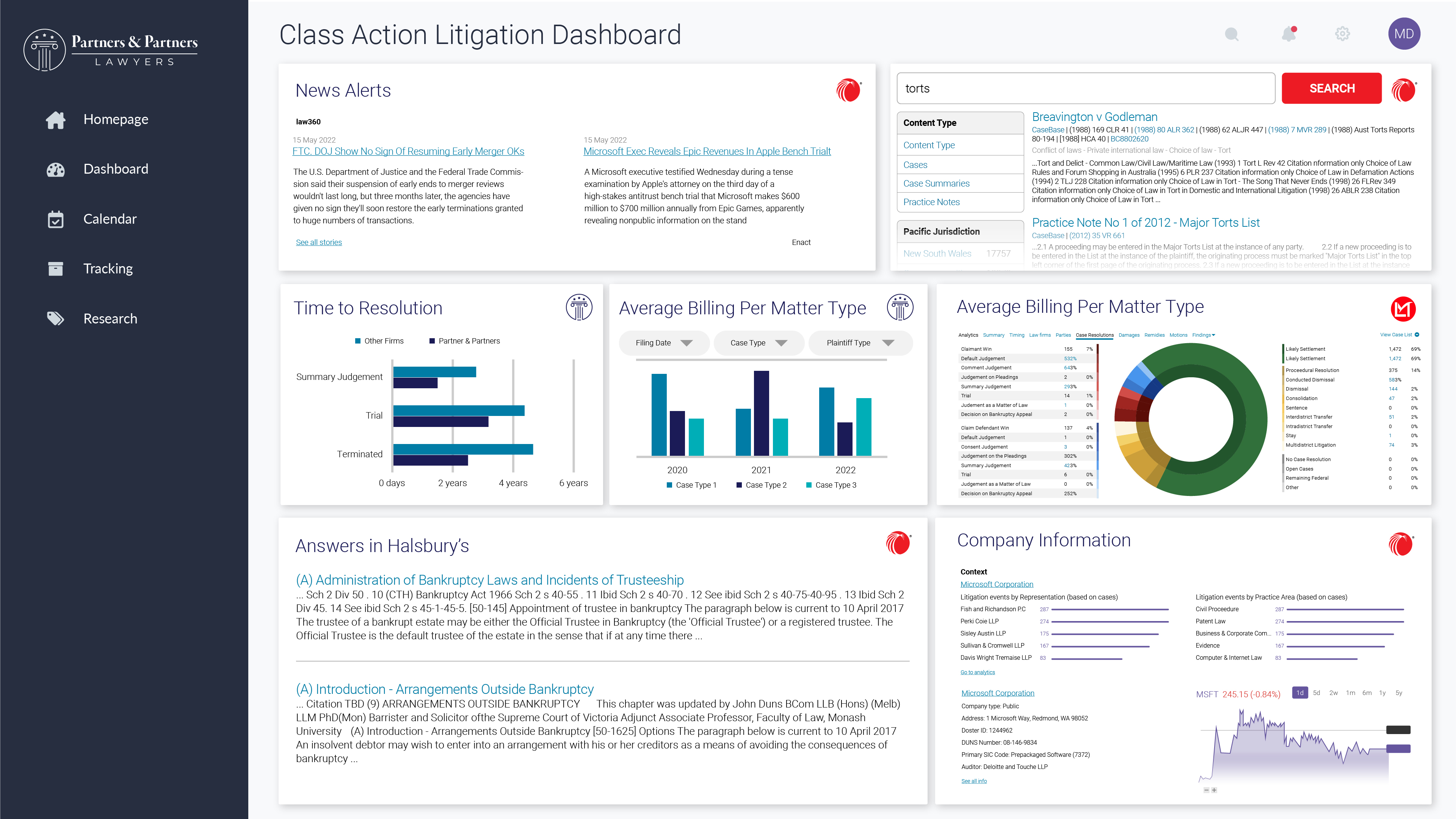How can APIs improve efficiency and productivity for the law firm of tomorrow?
12 September 2022 03:18
John Smith, a junior lawyer with Partners & Partners Lawyers, has begun his day earlier than usual. Snaking through the early morning CBD traffic, he starts to make a mental note of his To Do list – preparing a large class action suit for which he not only needs to wade through thousands of pages of case law, but also voluminous and complex legislation. Just as he slides into his seat, making a note of the sources he needs to log into, he notices an email from his Partner pop in his inbox. He now needs to search through past media coverage to unearth whatever he can on the class action litigants’ past actions and behaviour.
He stares at a long day ahead.
How can John make optimum use of his time to deliver the outcome he needs before the end of the day?
In a regular work day, John would have logged into the various subscriptions his firm has to research the matter at hand, waded through the firm’s repository, and browsed through pages and pages of search results via Google as well.
Instead, what if he had access to all the information he needed in one place, like his firm’s practice area page or matter management system?

This illustration is a mock-up only and does not necessarily reflect the final product. The user experience and content display will depend on many factors, such as: the specific requirements, the complexity of the API queries and the extent to which content can be surfaced.
With APIs (Application Programming Interfaces), law firms can decide what information they would like to surface within their applications and workflows with the expert help of their technology teams. Legal practitioners such as John could surface context-related search results from publishers such as LexisNexis®, news alerts regarding litigants, customer-related documents from their document management system, and billing data from the practice management tool – all within a dashboard in their practice area page.
The flexibility that APIs provide could further be leveraged to embed specific documents within workflows, surface company-related information in CRM systems to get a 360-degree view of customers, or proactively monitor legal as well as news alerts to know your customers better, proactively identify risk and avoid surprises. Taking the content that is now available at your fingertips, the firm’s engineers could integrate and enrich firm data with external content and develop the views practitioners need to deliver successful outcomes. The possibilities are endless.
I want to implement APIs, but how do I do it?
Once your law firm has embraced the need to bring in APIs and streamline its workflows, half the battle is won. However, the next question arises – how do I make this work?
- Decide on your ‘need’ – identify which teams would require APIs and why. Each team will have a different use case- be it the litigators, the strategy and innovation team, business development, or internal support groups
- Form your ‘core team’ – this will be the team that institutionalises the use of APIs within the firm. The most crucial team member would be from your technology group – in-house or from the third-party provider you work with. The technologist in the team will perform the most valuable role of deciding the feasibility of APIs and owning the development.
- Finalise your requirements – the core team will work with the content publisher to determine the requirements for the APIs and which options work best to address the needs of the firm.
- Do it – implement the APIs. Each content source provider will typically share the API code to embed into your workflows. Based on the core team’s recommendation, the technology group can customise the look and feel, and add the necessary layers of view required within the firm.
Content is now in your context.
The legal industry is on the brink of a digital transformation that will define what the law firm of the future looks like. A key facet of this transformation will be to streamline business processes and workflows to remain efficient, competitive and profitable in the long run. One of the simplest ways to make the technology landscape more efficient is by using APIs. The ability to create a cohesive content ecosystem through seamlessly integrated workflows will help legal practitioners provide a holistic client experience through any device and from anywhere.
 | Authored by Seeta Bodke Seeta Bodke is a Product Manager at LexisNexis for Lexis® Web Service APIs and Lexis® Legal Analytics . Lexis Web Service APIs integrate the trusted, authoritative content you’ve come to expect from LexisNexis directly into your most important business application within your own environment. End users can now have instant access to critical, relevant information as an integral part of their daily workflow. The content, available on Lexis Advance®, but delivered through our APIs will save valuable staff time, help drive deeper insights and give you and your users even more confidence when performing your daily tasks. The expansive universe of LexisNexis content now available at your fingertips. To know more about Lexis Web Service APIs, please fill in the form below and we will contact you. |
The scenario depicted above is a hypothetical use case and is not an actual customer story
Related Articles
-
 We have all been there: That moment in a meeting when someone announces: “We should get our external lawyers to have a look at this”
We have all been there: That moment in a meeting when someone announces: “We should get our external lawyers to have a look at this” -
 Drafting is essential but can be tedious, time consuming and error prone. How can technology help?
Drafting is essential but can be tedious, time consuming and error prone. How can technology help? -
 Formerly a lawyer, Lindsay now manages a team of talented Product Managers with responsibility for driving new products developments as well as the roadmaps for existing products. Having once been a customer of LexisNexis, Lindsay is passionate about driving efficiency improvements for lawyers enabling them to spend more time building their practice and achieving the best results for their clients. We took the opportunity to ask Lindsay a few questions about LexisNexis new service, Lexis Web Service APIs and how it helps firms achieve efficiencies.
Formerly a lawyer, Lindsay now manages a team of talented Product Managers with responsibility for driving new products developments as well as the roadmaps for existing products. Having once been a customer of LexisNexis, Lindsay is passionate about driving efficiency improvements for lawyers enabling them to spend more time building their practice and achieving the best results for their clients. We took the opportunity to ask Lindsay a few questions about LexisNexis new service, Lexis Web Service APIs and how it helps firms achieve efficiencies.
Contact our Experts Now

 LexisNexis
LexisNexis